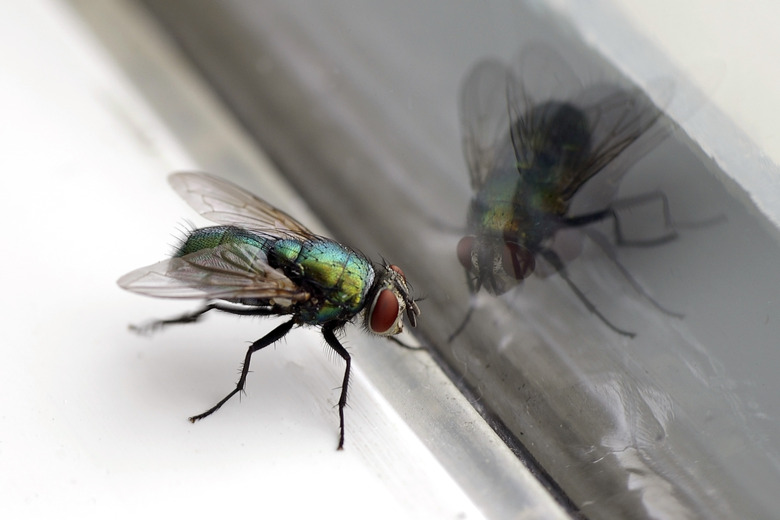Why Are There Flies In My Windows?
We may receive a commission on purchases made from links.
If you've been battling houseflies, you may have noticed that they often congregate in windows. There are reasons for this, and understanding them can help you get rid of these common household pests. They may only live a short 15 to 25 days, but this can feel like an eternity when they're buzzing around your house. Luckily, you can use their propensity for windows against them in your quest to rid yourself of them as quickly as possible.
The Wrong Reason
The Wrong Reason
There is a common misconception that flies gravitate toward windows because they're trying to find their way back outside. This may sound logical, but flies just aren't that smart. They don't really understand the concepts of inside and outside, and they certainly don't comprehend that an open window is a potential path to freedom.
The reality is that most flies make their way into your home completely by accident. They may come in because they're attracted to a certain smell, and they can also ride in on air currents as you open and close your doors or windows. They didn't enter your house intentionally, and they don't look for an escape route intentionally either.
Windows Are Warm
Windows Are Warm
There are exceptions to every rule, but most flies like warm weather. They tend to be active in temperatures above 60 degrees Fahrenheit but are most active between temperatures of 85 and 95 degrees Fahrenheit. This makes a windowsill a cozy, comfortable spot for flies. This warmth is especially attractive over the winter and when the air conditioning is on in your house. If you find a fly buzzing around your window, it's probably enjoying the warmth.
Windows Are Bright
Windows Are Bright
As is true of many insects, light attracts flies. A fly's two compound eyes are each composed of about 3,000 to 6,000 lenses. This makes it impossible for a fly to focus on a single object the way humans do. This multifaceted arrangement is excellent, however, for detecting both movement and light. This is why flies almost always see you coming when you try to swat them. It's also why you have better luck killing flies if you move slowly when lining up your fly swatter for the kill.
Because light is the only thing flies can really see, they are attracted to it and use it to navigate. When sunlight comes into your windows, flies are drawn to it and may try to use it to get their bearings, so to speak.
Getting the Upper Hand
Getting the Upper Hand
Now that you know why flies are attracted to windows, you can use this knowledge to eliminate fly problems safely. Spraying insecticides around your house is a bad idea, but understanding fly behavior gives you two safer options. One is to hang fly paper or fly traps in your windows. Fly paper is admittedly unattractive, but it's also effective. It works especially well in windows where flies are known to hang out.
You can also use light traps to capture flies. If you have a room without windows or want to keep trapping flies after dark, a light trap is a good way to catch flies. Install your light traps about 4 to 6 feet off the ground if you can, as this is the height at which houseflies normally roam. Place the trap where the flies inside your house will see it but the flies outside won't. If your light trap is visible from outside your house, it could attract more flies to your home.
A Multifaceted Approach
A Multifaceted Approach
Using windows and light to your advantage is an excellent approach, but it may not be enough. To truly eliminate a fly problem, you need to figure out what is attracting the flies and get rid of it. Clean up food spills immediately and do dishes frequently. Check underneath your trash can liner and make sure there isn't any smelly gunk hiding there. If there is, wash it out with soap and water. Always store food in tightly sealed containers.
Periodically clean sink and bathtub drains with a little vinegar and baking soda. Once in a while, it's also important to clean up areas where food and dirt may be lurking even if you clean often. This means cleaning under the refrigerator and behind the stove. Take your trash out promptly. It's also a good idea to check your window screens for holes and seal any possible entry points around windows and doors as well as around your home's foundation.
